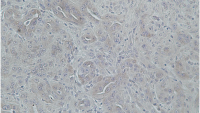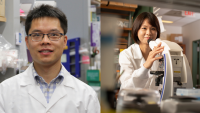Christine Iok In Chio, PhD
- Assistant Professor of Genetics and Development (in the Institute for Cancer Genetics)
On the web
Overview
Academic Appointments
- Assistant Professor of Genetics and Development (in the Institute for Cancer Genetics)
Credentials & Experience
Education & Training
- PhD, Medical Biophysics, University of Toronto
- Postdoctoral Fellowship, Cold Spring Harbor Laboratory
Committees, Societies, Councils
Present: Member of American Association of Cancer Research
2003-Present: Member of Golden Key International Honour Society
10/2013- Present: Damon Runyon Research Fellow
4/2015-Present: Member of American Association for Cancer Research
2/2017-Present: Editorial board member of “Gastroenterology and Liver Clinical and Medical Issues”
Honors & Awards
- Schaefer Research Scholar Award (2024)
- Irma T. Hirschl and Monique Weill-Caulier Research Award (2023)
- Pershing Square Sohn Young Investigator Award (2021)
- Ruth Leff Siegel Award for Excellence in Pancreatic Cancer Research (2020)
- V Scholar Foundation Award (2018-2020)
- Pancreatic Cancer Action Network Catalyst Grant (2018-2021)
- Department of Defense Career Development Award (2019-2021) *Declined
- Paul Marks Scholarship (internal award: Columbia University VP&S) (2018-2020)
- Aspen Cancer Conference fellowship
- Damon Runyon postdoctoral fellowship (2013-2017)
- Human Frontiers postdoctoral fellowship (2012-2013)
- Medical Biophysics Excellence Award
Research
Christine Chio studies Pancreatic ductal adenocarcinoma (PDAC) that represents the third leading cause of cancer death in the United States. Lethality of PDA owes largely to the advanced disease stage at the time of diagnosis and to its profound resistance to existing therapies. Targeted therapy is a cornerstone of precision medicine, and is currently the focus of much anticancer drug development. However, in the context of pancreatic cancer, no chemical inhibitors exist for the most common KRAS mutations (G12D, G12V) even though it is well established that the oncogenic KRAS promotes drug resistance. Thus, a detailed understanding of the role of specific genetic lesions and their signaling surrogates in the initiation and progression of PDA is critical to improving treatment efficacy and patient outcome for this disease. Using genetically engineered mouse models and ex vivo culture systems, the Chio lab seeks to understand the basic mechanisms underlying PDAC biology such that vulnerabilities can be identified and tested for therapeutic intervention. For more information please visit Chio Laboratory
Research Interests
- Pancreatic Cancer
Selected Publications
- Ross A, Pereira M, Ghore D, Kim J, Chio II*, Jovanovic M*. Systematic analysis of proteome turnover in pancreatic cancer. Cell Reports Methods. 2024;10;4(5):100760. *Co-correspondence
- He D, Feng H, Sundberg B, Yang J, Powers J, Christian A, Wilkinson J, Mommin C, Avizonis D, Thomas C, Friedman R, Kluger M, Hollingsworth M, Grandgenett, P, Klute K, Toste D, Chang C, Chio II. Methionine Oxidation Activates Pyruvate Kinase M2 to Promote Pancreatic Cancer Metastasis. Molecular Cell 82: 3045-3060 (2022).
- Chan KM, Robert F, Oertlin C, Kapeller-Libermann, D, Avizonis D, Park J, Schoepfer C, Da Silva B, Yao M, Gorton F, Thomas C, Brown L, Porco J, Doubrovin M, Pollak M, Larsson O, Pelletier J, Chio II. eIF4A supports an oncogenic translation program in pancreatic ductal adenocarcinoma. Nature Communications 10: 5151 (2019).
- Chio II, Jafarnejad SM, Ponz-Sarvise M, Park Y, Rivera K, Palm W, Wilson J, Sangar V, Hao Y, Ohlund D, Wright K, Filippini D, Lee EJ, Da Silva B, Schoepfer C, Wilkinson JE, Buscaglia JM, DeNicola GM, Tiriac H, Hammell M, Crawford HC, Schmidt EE, Thompson CB, Pappin DJ, Sonenberg N, Tuveson DA. NRF2 Promotes Tumor Maintenance by Modulating mRNA Translation in Pancreatic Cancer. Cell 166: 963-976 (2016).
- Boj SF*, Hwang CI*, Baker LA*, Chio II*, Engle DD*, Corbo V*, Jager M, Ponz-Sarvise M, Tiriac H, Spector MS, Gracanin A, Oni T, Yu KH, van Boxtel R, Huch M, Rivera KD, Wilson JP, Feigin ME, Ohlund D, Handly-Santana A, Ardito-Abraham CM, Ludwig M, Elyada E, Alagesan B, Biffi G, Yordanov GN, Delcuze B, Creighton B, Wright K, Park Y, Morsink FH, Molenaar IQ, Borel Rinkes IH, Cuppen E, Hao Y, Jin Y, Nijman IJ, Iacobuzio-Donahue C, Leach SD, Pappin DJ, Hammell M, Klimstra DS, Basturk O, Hruban RH, Offerhaus GJ, Vries RG, Clevers H, Tuveson DA. Organoid models of human and mouse ductal pancreatic cancer. Cell 160: 324-338 (2015). *Authors contributed equally to work.
For a complete list of publications, please visit PubMed.gov

